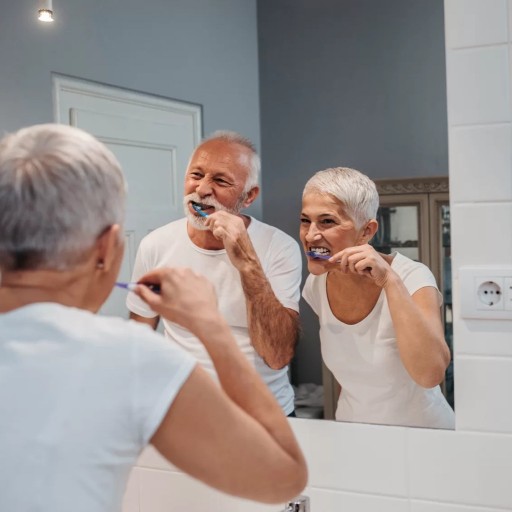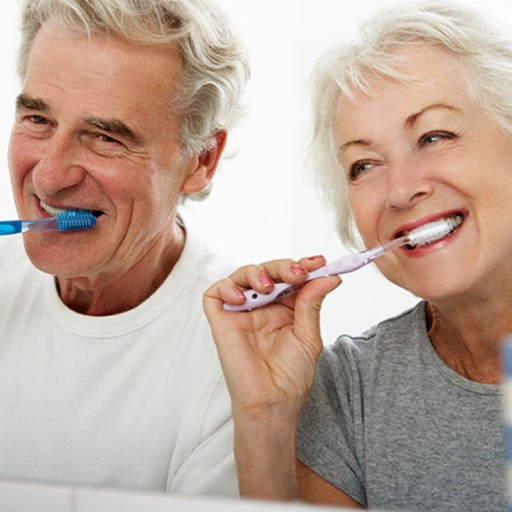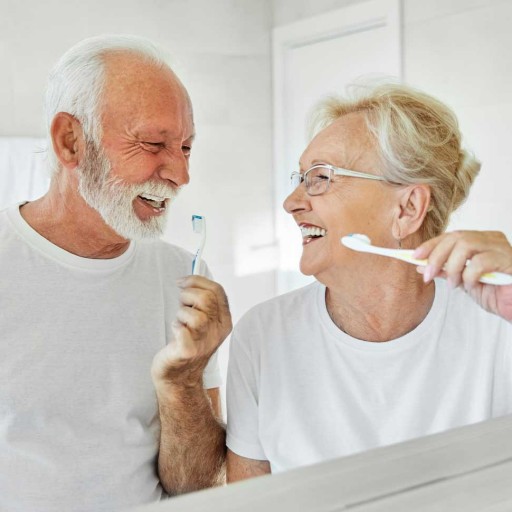Time flies, smiles all the time: How do the elderly maintain oral health?
At every stage of life, health is always our most precious wealth. As we age, our bodies will gradually undergo various changes, among which oral health is a particularly important issue for the elderly. Oral health is not only related to the quality of life of the elderly, but also an important part of their overall health.
It not only affects the elderly's eating, speaking and social skills, but is also closely related to systemic diseases such as diabetes and cardiovascular disease. Therefore, it is particularly important to improve the oral health awareness of the elderly and popularize correct oral health care knowledge.
1. Common oral problems of the elderly
Gum recession and root caries
Due to gum recession and increased interdental space, the elderly are prone to horizontal food impaction, and the neck and root surface of the teeth are very prone to caries, which may be accompanied by dentin sensitivity.
Gum recession causes the root of the tooth to be exposed, making the neck and root surface of the tooth more susceptible to bacterial erosion, thereby causing caries.
Tooth loss and loss
Dental disease and periodontal disease are the main causes of tooth loss and loss in the elderly. As people age, the number of missing teeth increases.
When the number of missing teeth accounts for more than 1/4 of the total teeth, it will affect the normal function of the oral cavity, especially the chewing function, and then affect the digestion and absorption of food.
Tooth wear and wedge-shaped defects
Tooth wear and wedge-shaped defects are related to many factors such as incorrect brushing methods, chewing hard food and aging.
Wear leads to dentin exposure, making the teeth sensitive or painful to cold, hot, sour, sweet and other stimuli. Severe wear can also cause pulp exposure and pulpitis, which can lead to apical periodontitis if not treated in time.
Oral mucosal diseases and oral cancer
Oral mucosal diseases in the elderly mainly include burning mouth syndrome, traumatic ulcers, candidiasis, leukoplakia and oral cancer. These diseases not only affect oral health, but may also cause serious psychological, communication and eating disorders.

2. Causes of oral problems in the elderly
Decreased organ function and reduced basal metabolism
As people age, their organ functions gradually decline, their basal metabolism decreases, and various tissues and organs related to the oral cavity also undergo significant aging changes. These changes make the incidence and prevention of oral diseases in the elderly special.
Incorrect oral hygiene habits
Due to the wide gaps between teeth, loose teeth, and exposed tooth roots, the elderly are more likely to have residual food residues and dental plaque. If you do not pay attention to oral hygiene, do not brush your teeth and rinse your mouth frequently, it is easy to cause oral diseases.
The impact of systemic diseases
The elderly often suffer from systemic diseases such as diabetes and hypertension. These diseases not only affect physical health, but also may affect the structure and function of the oral cavity, accompanied by oral fungal infections, etc.
Bad living habits
Bad living habits such as smoking and drinking are also important factors leading to oral diseases in the elderly. Smoking increases the risk of periodontal disease and oral cancer, and drinking may cause oral mucosal lesions.

3. How to avoid oral problems in the elderly
Pay attention to personal oral hygiene
The elderly should pay attention to oral hygiene, brush their teeth regularly in the morning and evening, rinse their mouths after meals, and pay more attention to the cleaning of the interproximal spaces of the teeth. When brushing your teeth, you should choose a health toothbrush that suits you.
The brush head should not be too large, the bristles should be soft and elastic, and the brush handle should be flat and wide, easy to hold.
Fluoride toothpaste can be used to help prevent root caries. Anti-sensitive, antibacterial and anti-inflammatory toothpaste can also be used alternately according to the health of teeth and periodontal tissues.
In addition, the elderly should also use interdental brushes, dental floss and toothpicks to remove food residues and dental plaque on the adjacent and root surfaces. If conditions permit, a water flosser can be used for oral cleaning.
When using toothpicks, high-quality, clean, flat or wedge-shaped wooden toothpicks should be used to slowly slide along the two tooth surfaces of the tooth gap to remove food stuck in the tooth gap.
Regular oral examinations
The purpose of regular oral examinations is to detect diseases early. The contents of the examination include caries (especially root caries), periodontal disease, oral mucosal diseases, etc.
The remaining roots in the mouth should be removed as soon as possible if they are often swollen and painful; the sharp tooth tips formed by excessive tooth wear should be removed and adjusted in time to prevent damage to the oral soft tissue and mandibular joint.
Oral examinations are best performed every six months, and generally at least once a year. When problems are found, they should be treated in time. For missing teeth, dentures should be repaired in time to reduce the chewing burden of the remaining teeth and restore the basic functions of the oral cavity.

Reasonable diet and balanced nutrition
The elderly should pay attention to a reasonable diet, balanced nutrition, and eat more foods rich in vitamins and minerals, such as fresh fruits, vegetables, milk, etc. These foods help to enhance the resistance of oral tissues and prevent the occurrence of oral diseases.
Maintain good living habits
The elderly should maintain good living habits, quit smoking and limit alcohol, avoid staying up late for a long time and overwork. These good living habits help maintain physical health and promote oral health.
Actively participate in oral health education and publicity
The elderly should actively participate in oral health education and publicity activities, understand oral health knowledge, and improve self-care awareness. Through learning and practice, master the correct oral hygiene methods and techniques to effectively prevent the occurrence of oral diseases.
Paying attention to and maintaining the oral health of the elderly is not only the key to improving their quality of life, but also the common responsibility of the whole society.
Through scientific oral health care measures, we can effectively prevent the occurrence of oral diseases, alleviate the pain of the elderly, and allow them to still enjoy food, speak freely, and smile in their later years.
Of course, maintaining the oral health of the elderly is not a one-day job. It requires the joint efforts of individuals, families, communities and even the whole society.
Let us start from now, start from ourselves, and pass on our care to every elderly person, so that they can have a healthier and better life in their later years in a warm and harmonious social environment.
OTHER NEWS
-
- The Future of Digital Currency: Prospects for Bitcoin and Ethereum
- By Prodosh Kundu 13 Jun,2024

-
- How to get an Auto Insurance Quote?
- By Little Grapes 30 May,2023

-
- Perhaps you Should Purchase a Life Insurance Policy.
- By Wendy 24 Apr,2023

-
- Demystifying Banking: How the Financial System Works
- By Little Grapes 11 Sep,2023

-
- Here's What you Need to Know About Balance Referrals
- By Little Grapes 24 Apr,2023

-
- How do I use my Credit Card Wisely?
- By Anna 24 Apr,2023

-
- What to do if Your Home Insurance Claim is Denied: A Comprehensive Guide!
- By Wendy 24 Jul,2023

-
- 5 Easy Ways You Can Buy Bitcoin
- By Prodosh Kundu 15 May,2024

-
- How do I buy Insurance?
- By Little Grapes 24 Apr,2023

-
- Do you Choose to Rent or buy a Home?
- By Wendy 24 Apr,2023

-
- Some Tips on Buying a Condo!
- By Wendy 24 Apr,2023

-
- Some Things About Credit Cards.
- By Wendy 24 Apr,2023

 1
1 1
1